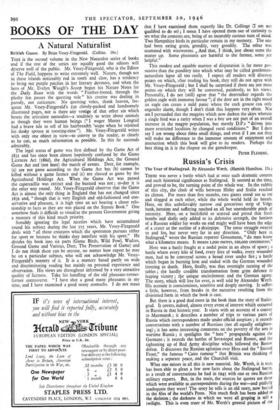BOOKS OF THE DAY
THIS is the second volume in the New Naturalist series of books and if the rest of the series are equally good the editors will deserve well of the public. Mr. Vesey-Fitzgerald, who is the Editor of The Field, happens to write extremely well. Nature, though not in these islands noticeably red in tooth and claw, has a tendency to bring out purple patches in her literary devotees, and when the hero of Mr. Evelyn Waugh's Scoop began his Nature Notes for the Daily Beast with the words " Feather-footed, through the plashy fen passes the questing vole " his creator was dealing in parody, not caricature. No questing voles, thank heaven, fre- quent Mr. Vesey-Fitzgerald's 23o closely-packed and handsomely illustrated pages, nor is there any vestioe of that other sin which besets the articulate naturalist—a tendency to write about animals as though they were human beings (" I wager Master Longtail had a brave tale to tell of his hairbreadth 'scape when he rejoined his dusky spouse at roosting-time "). Mr. Vesey-Fitzgerald writes with only one object in view—to convey to the reader, as clearly as he can, as much information as possible. In this he succeeds admirably.
The legal status of game was first defined by the Game Act of 1831 and has since been almost hopelessly confused by the Game Licences Act (186o), the Agricultural Holdings Act, the Ground Game Act and (not least) the march of events. Deer, for example, (a) are not game according to the Game Act but (b) cannot be killed without a game licence and (c) are classed as game by the Agricultural Holdings Act. When the Game Act was passed the capercaillie was extinct and the bustard was not • to-day it is the other way round. Mr. Vesey-Fitzgerald observes that the Game Act is almost the only thing in England that has not changed since 5831 and, " though that is very English and old-fashioned and con- servative and pleasant, it is high time an act bearing a closer rela- tionship to facts as they are was placed on the Statute Book.". One somehow finds it difficult to visualise the present Government giving a measure of this kind much priority.
Sensibly ignoring the legal niceties which have accumulated round his subject during the last 115 years, Mr. Vesey-Fitzgerald deals with " all those creatures which the sportsman pursues either for sport or because he thinks they interfere with his sport." He divides his book into six parts (Game Birds, Wild Fowl, Waders. Ground Game and Various, Deer, The Preservation of Game) and I do not think there can be anyone, no matter how expert he may be on a particular subject, who will not acknowledge Mr. Vesey- Fitzgerald's mastery of it. It is a mastery based partly on wide and discriminating reading but mainly on personal experience and observation. His views are throughout informed by a very attractive quality of fairness. Take his handling of the old pheasant-versus- farmer controversy. " I have shot a good many pheasants in my time, and I have examined a good many stomachs. I do not mean
that I have examined them expertly like Dr. Collinge (I am not qualified to do so) ; I mean I have opened them out of curiosity to see what the contents are, being of an incurably curious turn of mind. Two Hampshire birds in particular remain in my memory. The one had been eating grain, greedily, very greedily. The other was crammed with wireworms. • And that, I think, just about sums the matter up. Some pheasants are harmful to the farmer, some are helpful."
This modest and equable manner of disputation is far more per- suasive than the punditry into which what may be called gentlemen- naturalists lapse all too easily. I expect all readers will discover points on which, after reading his book, they still do not agree with Mr. Vesey-Fitzgerald ; but I shall be surprised if there are not more points on which they will be converted, painlessly, to his views. Personally, I do not (still) agree that " the deerstalker regards the golden eagle with immense favour "; if the deer are in the right mood an eagle can create a mild panic where the cock grouse can only engender alarm, though I don't think this happens very often. Nor am I persuaded that the magpies which now darken the skies wherein a single bird was a rarity when I was a boy are not part of an overall increase in the magpie population, but merely_ D.P.s "driven into more restricted localities by changed rural conditions." But I dare say I am wrong about these small things, and even if I am not they will make no difference to the immense amount of enjoyment and instruction which this book will give to its readers. Perhaps the best thing in it is the chapter on the gamekeeper.
PETER FLEMING.


























 Previous page
Previous page